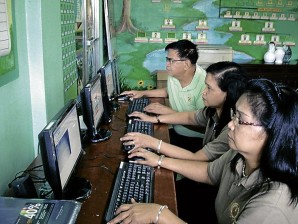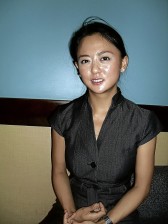Public school teachers go ‘camping’

ENGROSSED “Campers” at the Laguna site, these teachers are among close to 300 teachers who are currently being trained.
There is a new camp for teachers. But, unlike other camps, they do not get to spend time outdoors, build bonfires, and sleep in tents.
Launched on Nov. 18, 2011, Camp, actually short for Computer Access Mentorship Program, aims to help educators improve their skills.
Camp focuses on training public elementary school teachers online to help sharpen their knowledge and skills in the teaching of reading.
A public-private initiative of Sa Aklat Sisikat Foundation Inc. (Sasfi), with the Boy Scouts of the Philippines (BSP) and the Department of Education (DepEd), Camp is funded by the Asian Development Bank (ADB), through the Republic of Korea e-Asia and Knowledge Partnership Fund.
Designed to nurture teachers who will help build a nation of readers, Camp aims to empower educators, innovate and improve teacher practice and foster a pupil-centered against a lecture-driven active learning environment.
It seeks to enhance student learning by giving public school teachers access to information communication technology.
E-camps
Through Camp, teachers get greater access to online, in-service training. The program is establishing a nationwide network of 25 computer laboratories, called Camp sites, where teachers can complete the Reading for Meaning program.
“We created Camp sites because of two beliefs. First was that we wanted to provide Internet for free. And, second, we weren’t sure about the digital aspect on a large scale. We wanted to know if teachers accessed the Internet regularly,” said Clarissa Isabelle Delgado, Sasfi director of special projects.
Camp sites are located in BSP council offices, which are usually near elementary schools, providing teachers easy access. Each site has three computers with Internet connection, a printer and a scanner that public school educators can use for free.
As of March 21, 15 Camp sites have been set up in Luzon. One Camp site in Calauan, Laguna, was funded privately and not covered by the ADB grant. By September, 10 additional sites will be put up—six in the Visayas and four in Mindanao.
Aside from hosting Camp sites, the BSP is assigning a custodian for each site to maintain the hardware and the laboratory.
In its first four months, the program successfully trained 260 public elementary school teachers. Some 292 teachers are currently being trained. They are expected to finish the course within the month.
A total of 1,400 teachers have already registered online. Sasfi’s goal is to train and graduate 9,000 teachers from its in-service literacy training by April 2013.
Since 1999, Sasfi has been working with public schools nationwide, providing them the resources needed to implement a program that will help students develop the love for and habit of reading. It aims to bridge the education gap in the Philippines by promoting functional literacy and progressive teacher and administrator training.
To reach its target number of teachers, Sasfi collaborates with BSP and DepEd in promoting the program to elementary teachers. DepEd has issued memoranda and orders on the program to all public schools nationwide.
Although the number of sites is limited, any teacher can access the Camp anytime, provided they have Internet access. Teachers can strengthen their teaching skills and competencies in functional literacy at practically no cost.
They only need to log on to www.sasonline.com.ph and register. After registering, they can start training using the modules provided by Camp.
Delgado said it would only take four to eight hours to finish the training, depending on the skill and dedication of the teacher.
After completing the program, the teacher can take the assessment survey to determine his/her competency in teaching reading to elementary students. Successful “graduates” will receive certificates, which are recognized by DepEd and can be used in their performance appraisal.
Although even nonpublic school teachers could register with Camp, Delgado said they were promoting the program mainly among public elementary school teachers.
Sasfi is planning to make a more advanced program and more in-depth modules in the near future.
“We’re beginning to explore Camp [version] 2. We’re talking to potential donors about this,” Delgado said.















